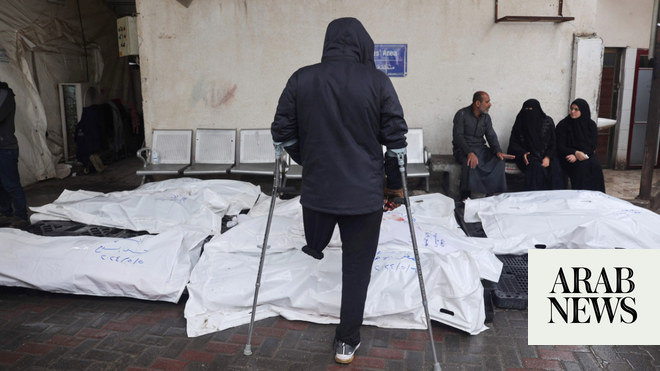Hezbollah deputy leader says group will stop fighting Israel after Gaza ceasefire
BEIRUT: The deputy leader of Lebanon’s armed group Hezbollah said on Tuesday that the only sure path to a ceasefire on the Lebanese-Israeli border is a complete ceasefire in the Gaza Strip.
“If there is a ceasefire in Gaza, we will end it without any discussion,” Hezbollah deputy leader Sheikh Naim Qassem told The Associated Press at the group’s political office in a southern suburb of Beirut.
Hezbollah’s participation in Israel’s war with Hamas was a “support front” for its ally, Hamas, Kassem said, and “if the war ends, this military support will cease to exist.”
However, he added that if Israel limits its military operations without a formal ceasefire agreement and a complete withdrawal from Gaza, the consequences for the conflict on the Lebanese-Israeli border will be less clear.
“If what is happening in Gaza is a mixture of a ceasefire and no ceasefire, war and no war, we cannot answer now (how we would react) because we do not know its shape, its results, its impact,” Kassem said during the 40-minute interview.
The war began on Oct. 7 after Hamas militants invaded southern Israel, killing some 1,200 people — mostly civilians — and abducting about 250. Israel responded with air and ground attacks that caused widespread destruction and killed more than 37,900 people in the Gaza Strip, according to the territory’s Health Ministry, which does not distinguish between militants and civilians in its count.
Ceasefire talks in Gaza have collapsed in recent weeks, raising fears of an escalation on the Lebanese-Israeli front. Hezbollah has exchanged near-daily attacks with Israeli forces along the border over the past nine months.
Low-level conflict between Israel and Hezbollah has displaced tens of thousands of people on both sides of the Israel-Lebanon border. In northern Israel, 16 soldiers and 11 civilians were killed; in Lebanon, more than 450 people were killed — mostly militants but also dozens of civilians
Hamas is demanding an end to the war in Gaza, not just a pause in the fighting, while Israeli Prime Minister Benjamin Netanyahu has refused to make such a commitment until Israel achieves its goals of destroying Hamas’s military and governmental capabilities and bringing home some 120 hostages still held by Hamas.
Last month, the Israeli military said it had “approved and confirmed” plans for an offensive in Lebanon if a diplomatic solution to the ongoing clashes was not reached. Any decision to launch such an operation would have to be made by the country’s political leadership.
Some Israeli officials have said they are seeking a diplomatic solution to the impasse and hope to avoid war. At the same time, they have warned that scenes of destruction seen in Gaza would be repeated in Lebanon if war breaks out.
Hezbollah, meanwhile, is far more powerful than Hamas and is believed to have a vast arsenal of rockets and missiles capable of striking anywhere in Israel.
Qassem said he does not believe Israel currently has the capacity — or has made the decision — to launch a full-blown war against Hezbollah. He warned that even if Israel intends to launch a limited operation in Lebanon that falls short of a full-blown war, it should not expect the fighting to remain limited.
“Israel can decide what it wants: a limited war, a total war, a partial war,” he said. “But it should expect that our response and our resistance will not be within the ceiling and the rules of engagement set by Israel… If Israel wages war, it means that it does not control its scope or who enters it.”
The latter was an apparent reference to Hezbollah’s allies in the so-called Iranian-backed “axis of resistance” in the region. Armed groups in Iraq, Syria, Yemen and elsewhere — and potentially Iran itself — could join the fight in the event of a full-scale war in Lebanon, which could also draw in Israel’s strongest ally, the United States.
American and European diplomats have been shuttling between Lebanon and Israel for months, trying to prevent a more serious conflict.
Kassem said he met with the deputy head of German intelligence, Ole Dieh, in Beirut on Saturday. American officials do not meet directly with Hezbollah because Washington has designated it a terrorist group, but they regularly send messages through intermediaries.
Qassem said White House envoy Amos Hochstein recently requested through intermediaries that Hezbollah pressure Hamas to accept a ceasefire and hostage exchange proposal put forward by U.S. President Joe Biden. He said Hezbollah rejected the request.
“It is Hamas that makes the decisions and whoever wants to ask for something should go to it directly,” he said.
Qassem criticized U.S. efforts to resolve the Gaza war, saying the U.S. supported Israel’s plans to end Hamas’s presence in Gaza. A constructive agreement, he said, would aim to end the war, withdraw Israel from Gaza and secure the release of hostages.
He added that once a ceasefire is reached, political decisions could determine the arrangements within the Gaza Strip and on the front with Lebanon.

